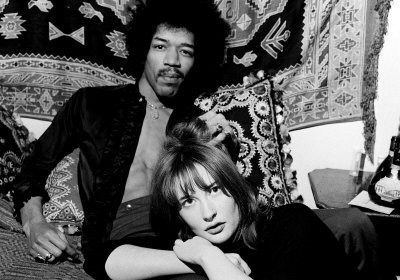
Kathy Etchingham was a DJ working in London when she met a young Jimi Hendrix on his first day in the city in 1966. They would date for the next three years, during Hendrix’s rise to stardom, and live together in London until 1969. Etchingham played a key role in Hendrix’s life, inspiring, among other songs, the much-loved “Wind Cries Mary” (Mary is her middle name) and “Foxy Lady.” Etchingham has recently made news for denouncing the new film All Is By My Side, starring André 3000 as Jimi Hendrix and written by 12 Years a Slave screenwriter John Ridley. The film depicts Hendrix physically abusing Etchingham––a total fabrication, she says. Etchingham spoke with me via email about women’s roles and stereotypes in the music industry, her attempts to set the record straight, and what it was like to be part of the greatest era in modern music. (All links in Etchingham’s quotes were provided by her, as was the image of Etchingham and Hendrix in 1969.)
You’ve said publicly that the abuse depicted in the film never occurred. To your knowledge, is there any basis for this being added to the film? Do you have any idea where the story came from?
When I first heard about the film I was puzzled as to the reason why Ridley wrote this fictitious abuse into the film and how he has subsequently claimed that his story is based on checked documentation.
Then I was reminded by a Hendrix biographer of a book by Curtis Knight from the early ’70s in which Knight claims to have interviewed me and in which I describe domestic violence. I have never even met, and have certainly never given an interview to, Curtis Knight. At the time that this “interview” was claimed to have occurred in London I was in fact living in Hong Kong, and then went to California.
When I returned to London in 1974 I was shown Curtis Knight’s book and immediately took legal action against the publishers using a firm of lawyers called Turners of Stone Buildings, Lincoln’s Inn Fields. Curtis Knight admitted that he had never interviewed me and all copies of the book in the UK were destroyed. My legal costs were paid. Unfortunately the book continued to be sold in the USA and extracts are on the internet. I cannot take legal action in every country in the world.
I am told that Knight’s book describes him frequently talking to Jimi on the phone while he was in London, which is absurd considering the cost and difficulties with making international calls at the time, and in any case it was usually me who answered the phone. I am told that it also describes Jimi traveling on the astral plane with purple rays coming out of his eyes. All the serious Jimi biographers have discounted Knight’s book as other people apart from myself have complained that their “interviews” recorded in the book never happened.
Have you ever corresponded with John Ridley or any of the film’s producers about your role in Hendrix’s life? Have they responded to your complaints about the abusive scenes? (I did reach out to Ridley’s people for comment but received no response.)
I wrote to Ridley before the film was completed congratulating him and offering my help but he did not reply. When I then asked for a copy of the film to ensure it was not defamatory or incorrect I received an abusive reply from his lawyers threatening to sue me for interfering with his rights to free speech.
They have put out a statement, which gave us the clue that they might be using Knight’s book.
I looked up Curtis Knight and it sounds like his books include a lot of paranormal stuff, UFOs, etc. as you alluded. It’s amazing that anyone would find such a source credible! I did find that the book Becoming Jimi Hendrix, by Steven Roby and Brad Schreiber, describes your relationship with Hendrix as “rife with fighting and volatility” (176), though it seems to only go so far as the famous kitchen-utensil-throwing “Wind Cries Mary” prelude. The book also notes that Hendrix lived with you longer than any other woman. Do you find the “volatility” description accurate?
No. I don’t know where this “volatility” idea comes from. We were both in our early twenties and fairly normal. No more volatile than anyone else at that age.
It’s possible Ridley took his inspiration for the abuse scenes from Charles Cross’s book Room Full of Mirrors, which describes Hendrix grabbing the phone from you at one point and hitting you with the receiver at the Bag O’Nails Pub (179); Cross notes that it was out of character and the result of heavy drinking combined with jealousy. Did Cross interview you, and is this story in any way accurate?
Charles Cross never interviewed me and he later apologised for getting that wrong. What happened was that Jimi grabbed the phone from my hand because he was trying to get my attention. I was annoyed by this and grabbed it back. I then went all grumpy and sat with John Lennon and Paul McCartney and wouldn’t talk to him until I had calmed down.
Charles Cross has interviewed hundreds of people and never once heard of Jimi hitting anyone. The trouble with these biographers is that they repeat inaccurate tittle tattle without checking their facts.
After Ridley’s statement and his lawyers’ letter to you, do you have any other recourse other than denouncing the film? What’s next for you?
I am taking legal advice. In the USA the first amendment protects them but everywhere else in the world the onus is on them to prove that it is true.
How did Hendrix’s drug and alcohol abuse issues affect you? Can you talk a bit about the line between an intense relationship and an abusive one?
Things only got out of control after New York [Hendrix began living in upstate New York in mid 1969]. There were so many druggy types and unpleasant hangers-on that I couldn’t stand it and went back to London. Apparently drugs and alcohol became issues after that, but I was not there. I don’t know how to answer your second question because there was no abuse. Arguments, but no abuse.
You’re in the position of having to set the record straight on a case of abuse that you’re saying was fabricated, as opposed to the more common position of being a woman accusing a famous figure of abuse or harassment and facing the backlash from that. What has it been like sharing your story in the media recently––Do you feel you’re being listened to and portrayed fairly (the film aside)? How are the former partners of musicians treated in the public eye?
Here in Australia and in the UK I am portrayed fairly but I am virtually unknown in the US. I think it must be the different attitude that people have about Jimi in the US compared to the UK. In the US he was the wild black man of rock. In England he was just Jimi and regarded with affection.
The film also has the same stereotype of Jimi being wild, violent, inarticulate and rather stupid which is also racist. Ridley has form when it comes to stereotyping [the linked Ridley essay received much controversy; CN: racial slur].
Women in the lives of famous musicians tend to be depicted within a few specific tropes: the muse (Patty Boyd comes to mind), the wronged victim or nameless groupie, the “Yoko” (she’s her own trope, it seems, with the media and fans depicting her as the reason for the Beatles’ breakup), rather than individuals with stories and agency in their own right. What are your thoughts on that, as a former music industry professional yourself, and do you think this depiction of you as an abuse victim is an example of that?
Yes, I think you have a point there.
I am depicted as a loud-mouthed low class groupie in the film from the low-class groupie sexist stereotype. If Ridley had contacted any of Jimi’s London friends they could have put him right there. It is essential to his storyline though, because in the film I am the “bad” groupie who wears ugly clothes and goes bonkers and takes an overdose whereas Linda Keith is the “good” groupie who inexplicably does not get together with Jimi. In fact Linda Keith was not around and she disappeared after Jimi’s first day in England.
What is it like watching songs written about you or in reference to you become iconic over decades?
The point is with Jimi, or any artist like that I suppose, is that they write their lyrics affected by on what is going on around them and their own internal thoughts so as he and I were together during his most productive time I was bound to be in some of them one way or another. It does not affect me emotionally or anything. I asked him to take my name out of one or two, though.
What have you observed about the way cultural narratives of rock stars have changed since the ’60s? Do we idolize/idealize them more now? Perhaps less? Do you see, as perhaps with this film, a revisionist tendency––a desire to shatter illusions about rock icons, that sometimes goes too far?
I think things are much the same now as they were then. Actually, London in the ’60s was fairly easygoing because people were used to “rock stars” just going about their normal business. Now there has to be more security because of unhinged fans, paparazzi, and so on.
I can’t comment on Ridley’s motivation for writing such a repellent script.
You’ve written a book about this time in your life. What is the biggest challenge when writing about a legendary musician whom you’ve known intimately?
There was no challenge. I just dictated the story as it was.
What was it like being a female DJ in the ’60s?
I enjoyed the jobs at the Cromwellian and the Scotch of St. James, but it was hard work because my sets ended very late and sleep was limited. Also I had pressure to play more commercially oriented stuff towards the end. Just after I quit at the Scotch to concentrate on hairdressing, I met Jimi.




